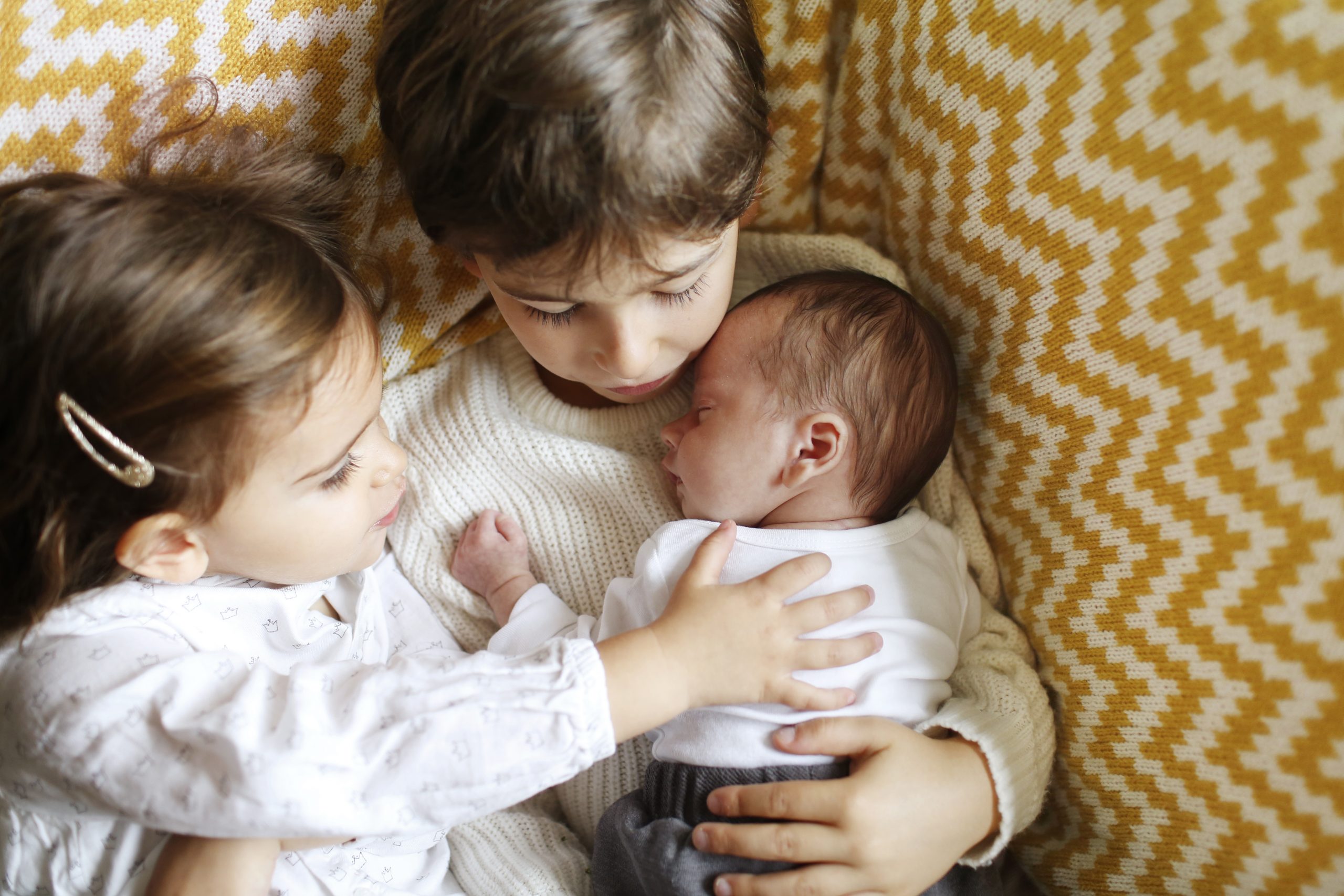Can our birth order really affect our personality? We explore whether the eldest, middle, and youngest child stereotypes are accurate
Are first borns really the bossy ones - and are youngest children really the most fun?

Is the first born really the most responsible? Does middle child syndrome exist? Find out if your birth order has any bearing on your personality...
We're all aware of the old adage that says the eldest child is the most responsible and reliable. Most people subscribe to the idea that the youngest is the class clown, or the one that 'grows up too quickly.' And then, there's the popular idea of middle child syndrome. This iswhen the middle sibling is 'overlooked', and so acts out to get the parents attention.The idea that your personality could be affected by birth order has long been considered possible.
And we'd all love to swear that yes, our birth order really does mean that we are the funniest sibling - but is there actually any truth to the stereotypes about sibling meaning and the role that birth order plays in our personalities as we get older?
Well, a few sources, including a recent piece of YouGov research, think there is some basis in it. As the research finds, "In short, it turns out to be true that the oldest child in afamily feels a greater weight of responsibility, while the youngestchild feels a higher level of breathing room."
In addition, research from psychologist Kevin Leman, published in The New Birth Order Book: Why You Are The Way You Are, has said that we may even bemore suited to certain people depending on the order in which we wereborn.
Intrigued? We take a look at whether or not these ideas really do hold up...
First born
The stereotype:People generally hold the view that the first-born in any family is the most adult-like. They're ambitious, responsible, and desperate for the approval of parents, teachers, bosses.
Sign up to our free daily email for the latest royal and entertainment news, interesting opinion, expert advice on styling and beauty trends, and no-nonsense guides to the health and wellness questions you want answered.
Is it true? Generally speaking, yes. Experts believe that it all harks back to those first, formative years. When the eldest child is born, they are the sole focus of the parents' love and attention. So, the oldest is often said to be the most advanced, and most capable of taking on responsibilities, having had their parents' focus as they grew up.
However,even if the eldest sibling is generally seen as the most put together, the pressure of trying to please can easily get to them. According to clinical psychologist Linda Blair, the eldest is apparently more likely to suffer feelings of anxiety and insecurity, due to losing the attention of parents when the second child comes along. But, because of the first-born's reliance on authority figures, they're more likely to seek help from a professional - which can only be a good thing.

Middle child
The stereotypes:Middle children are often seen as the rebels, acting up against the older sibling. There's also an idea that the middle sibling is always vying for their parents attention, resulting in them being jealous and stubborn. Children in the middle are also regarded as the social butterfly in the family.
Is it true? The sibling stuck in the middle is actually, scientifically, the peace-keeper. One of the co-authors of The Secret Power of Middle Children,Catherine Salmon, PhD, says, "Middle-borns don't have the rights of the oldest or privileges of the youngest" so, rather than rebelling will often try to become experts at negotiating. However, the middle child doesn't usually have the weight of their parents expectations on them in the same way the eldest did, which could alternatively result in them being more relaxed than any of their elder siblings, possibly explaining why they're seen as the most sociable.
And new research suggests that being the middle sibling definitely isn't a bad thing - quite the opposite in fact. Katrin Schumann, author of The Secret Power of Middle Children: How Middleborns Can Harness Their Unexpected and Remarkable Abilities has said that her research has found middle-borns to often be the most successful of their siblings - take Bill Gates and Britney Spears for example, two highly successsful, middle-born children.
However, the middle-born might not have had as strict a rules as their older siblings. So while they're usually concerned with mediating between everyone else, this can mean that their feelings can get left to one side.
Youngest child
The stereotypes:Spoilt, the joker of the family...there are a wealth of adjectives used to describe the youngest child. The youngest of the siblings is generally stereotyped as the baby of the family, who needs looking after and adjusts their personality accordingly.
Is it true? Again, there is often truth in the stereotypical personality traits of the youngest sibling. Psychologist Linda Blair says the youngest child is often dependent, having (most likely) been looked after by the parents and older siblings. However one study says that there is not a link between being the youngest child and displaying problem behaviour - suggesting the littlest sibling shouldn't be the one to act out.
However, the youngest is often the most carefree and, as such, more of a risk-taker than their older siblings. Psychologists believe that this is because parents are often less cautious by the time the youngest child joins the family. They've already been through a tidal wave of worries and concerns with the older siblings.
Only child
The stereotypes:Think of an only child, and a few of the words that probably come to mind are spoilt, or selfish, perhaps? There's a perception that if you're the only child in a family, you'll have been lavished with attention and praise. This might as well translate into an adult who isn't particularly well-equipped to deal with the real world.
Is it true? Luckily, this is one stereotype which doesn't ring true. Newman has found throughout, that "the studies all show that only children are not spoiled." And only children not lonely. According to an Ohio State University of 13,000 school children, only children have the same amount of friends as children frommulti-sibling families.
However, Dr Carl Pickhardt, a family therapist, has said that only children do tend to be over-confident, due to being around mostly adults in the home environment. Pickhardt says, "they tend to be comfortable dealing with adult authorities...because to some degree they put themselves on the same standing."
Do we all fit into the siblings meaning stereotypes?
According to the White-Campbell Psychological Birth Order Inventory, only 23% of women and 15% of men are a complete match for their expected personality. Frank J Sulloway, psychologist and author of Born To Rebel, also says that nothing decides your personality more than your genetics. So, although the stereotypes may ring true, it seems that in reality you really are just born that way.
Who should we marry, according to our birth order?
If you are a firstborn, you should marry...a last-born. You shouldn't marry...another first-born.
Why? According to psychologist Kevin Leman and his new book, it's often a case of opposites attract. The first-born in the pair will keep the marriage and home on track and organised, while the last-born will help the older sibling not to take everything so seriously.
If you are a middle child, you should marry...a last-born. You shouldn't marry... another middle child.
Why? Apparently, middle children don't communicate well. So with a combination of the two, you may be stuck with a marriage that could end up in disaster. However, a compromising middle-born tends to make a good match for a last-born, who are a lot more outgoing and talkative.
If you are a last-born, you should marry...a first-born. You shouldn't marry...another last-born.
Why? According to Leman, putting two last-borns together is a recipe for disaster. The psychologist says that last-borns have a tendency to pass the blame without taking responsibility - not an ideal combination in a marriage. But, by putting a first-born and a last-born together in a romantic relationship, you may be on to a winning marriage.
Of course, there's no reason to discount any kind of romantic relationship based on these theories alone - but it's certainly interesting to note! Particularly if you are already married or in a long-term relationship...
Amy Hunt is an experienced digital journalist specialising in homes, interiors and hobbies. She began her career working as the features assistant at woman&home magazine, before moving over to the digital side of the brand where she eventually became the Lifestyle Editor up until January 2022. Amy won the Digital Journalist of the Year award at the AOP Awards in 2019 for her work on womanandhome.com.

